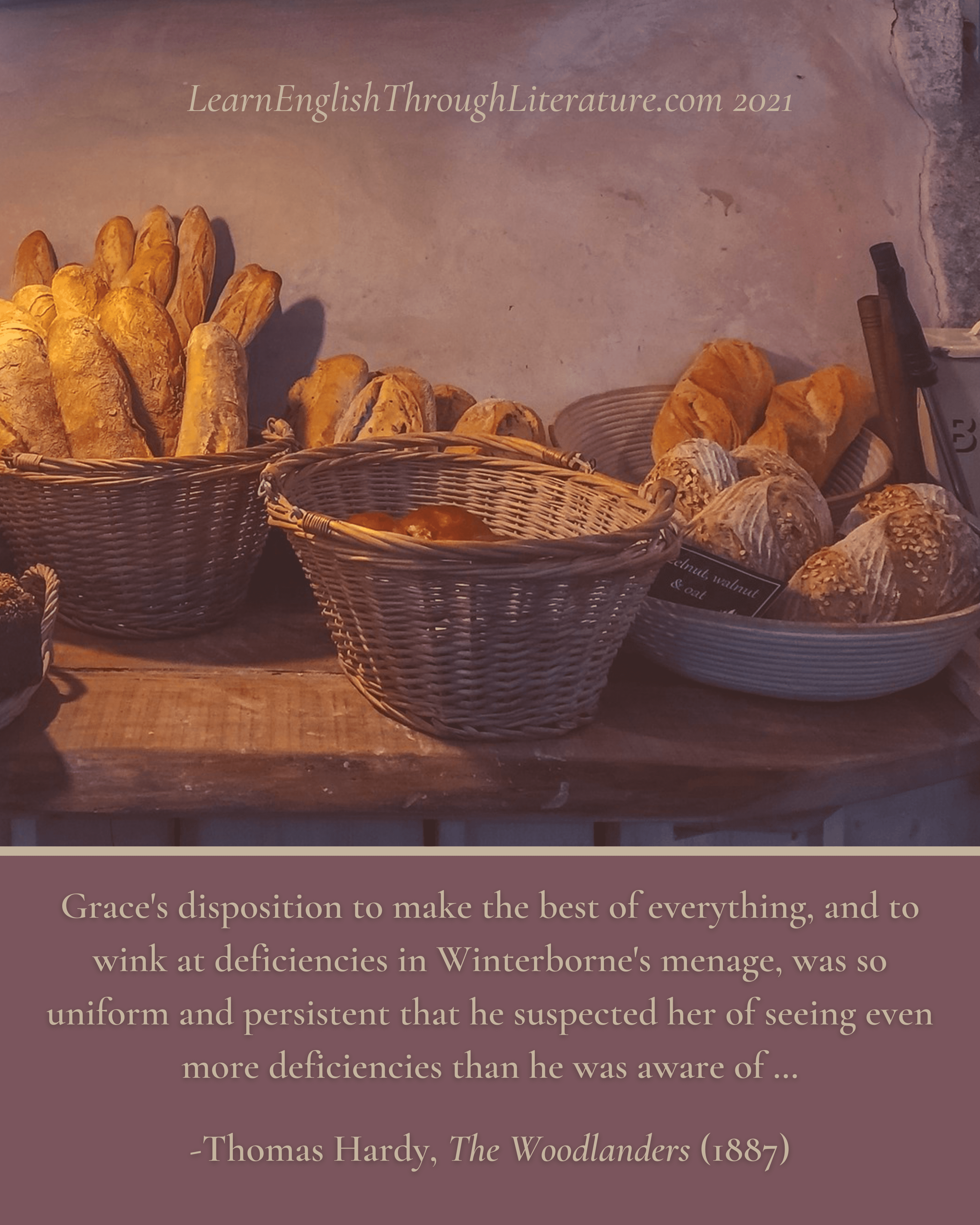📙 Grace’s disposition to make the best of everything, and to wink at deficiencies in Winterborne’s menage, was so uniform and persistent that he suspected her of seeing even more deficiencies than he was aware of …
‘… It reminds me so pleasantly that everything here in dear old Hintock is just as it used to be. The oil is — not quite nice; but everything else is.’
‘The oil?’
‘On the chairs, I mean; because it gets on one’s dress. Still, mine is not a new one.’
– Thomas Hardy, The Woodlanders (1887)
…
We will look here at how apostrophes of contraction and possessive apostrophes are used in English, and specifically in Thomas Hardy’s The Woodlanders. (If you missed Part 1 do check it out first, as we covered therein the main reasons behind their differences).
…
📝 # APOSTROPHES OF CONTRACTION
In this passage, Giles Winterborne has just approached Grace’s father, Mr Melbury, to ask his family to dinner.
📙 Melbury would give no answer at once. “No, I can’t tell you to-day,” he said. “I must talk it over with the women. As far as I am concerned, my dear Giles, you know I’ll come with pleasure. But how do I know what Grace’s notions may be? You see, she has been away among cultivated folks a good while; and now this acquaintance with Mrs. Charmond—Well, I’ll ask her. I can say no more.”
When he reached home that evening, he said to Grace and Mrs. Melbury, who were working at a little table by the fire, “Giles wants us to go down and spend an hour with him the day after to-morrow; and I’m thinking, that as ’tis Giles who asks us, we’ll go.”
– Thomas Hardy, The Woodlanders (1887)
👉 Do you notice the apostrophes of contraction here? They include:
- can’t
- I’ll
- I’m
- ‘tis (short for ‘it is’)
- we’ll
Here are some more common ones:
- ’em (short for ‘them’)
- they’d (short for ‘they had’ or ‘they would’)
📙 ‘”I told three of ’em they might drop in if they’d nothing else to do,” Giles mildly admitted.’
– Thomas Hardy, The Woodlanders (emphases mine)
- didn’t (short for ‘did not’)
- ‘twas (short for ‘it was’)
📙 ‘”Now, why the name didn’t ye tell us ’twas going to be a serious kind of thing before? How should I know what folk mean if they don’t say? Now, shall we come in, or shall we go home and come back along in a couple of hours?”‘
– Thomas Hardy, The Woodlanders (emphases mine)
- you’ll
📙 ‘”I hope you’ll stay, if you’ll be so good as not to mind, now you are here.”‘
– Thomas Hardy, The Woodlanders (emphases mine)
- don’t (short for ‘do not’)
- won’t (short for ‘will not’)
📙 ‘”Don’t keep us here in the sitting-room; lead on to the bakehouse, man. Now we are here we’ll help ye get ready for the rest. Here … help him out in his baking, or he won’t get done to-night.”‘
– Thomas Hardy, The Woodlanders (emphases mine)
- that’s (short for ‘that is’)
- you’d (short for ‘you would’)
📙 ‘”Now that’s a thing I never could mind; no, not if you’d paid me in silver and gold …”’
– Thomas Hardy, The Woodlanders (emphases mine)
…
📝 # POSSESSIVE APOSTROPHES IN CONTEXT
- timber-merchant’s
📙 ‘Before taking a single step in the preparations, Winterborne, with no great hopes, went across that evening to the timber-merchant’s to ascertain if Grace and her parents would honour him with their presence.’
– Thomas Hardy, The Woodlanders (emphasis mine)
✍️ Note: When a noun has a possessive apostrophe but is not followed by any other noun, as in the quotation above (‘to the timber-merchant’s’), it generally means that person’s home, in this case, the timber-merchant’s house or home.
- Giles’s bed, Giles’s father
📙 ‘Being a bachelor of rather retiring habits, the whole of the preparations devolved upon himself and his trusty man and familiar, Robert Creedle, who did everything that required doing, from making Giles’s bed to catching moles in his field. He was a survival from the days when Giles’s father held the homestead, and Giles was a playing boy.’
– Thomas Hardy, The Woodlanders (emphases mine)
Here we see how a singular noun that ends with an ‘s’ still uses both an apostrophe and an ‘s’ in the genitive or possessive case.
- Grace’s notions
📙 ‘But how do I know what Grace’s notions may be?’
– Thomas Hardy, The Woodlanders (emphasis mine)
👉 Notice how even though the name Grace ends with an ‘s’ sound, it still needs an apostrophe followed by an ‘s’ afterwards to show possession.
- Winterborne’s domicile (Winterborne’s home)
📙 ‘At this hour stir and bustle pervaded the interior of Winterborne’s domicile from cellar to apple-loft.’
– Thomas Hardy, The Woodlanders (emphasis mine)
…
That concludes our Lesson for today, but as always let me know through the contact form if you have any questions and I will be happy to help clarify anything.




